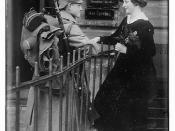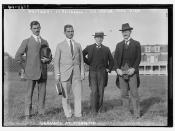The German Revolutions where sparked off by the overthrowing of the French King Louis-Philippe. The news spread and sparked off revolutions in many small southwestern German states that gradually spread northwards. These revolutions received help with information from Vienna that Metternich was no longer in power. Peasants stormed castles, attacked their lords. Artisans destroyed machinery that was destroying their livelihood. Radical republicans attempted an armed uprising in Baden but this attracted little to no public support and was easily crushed by the Liberal government. The main weapons of these revolutions were not guns nor violence but meetings, demonstrations and petitions. Maybe this can explain why the revolutions achieved so little. Violence was the way of the world, countries settled disputes through steel and blood. Maybe no one could respect the decisions of the elected body as it was seen as weak and feeble? But it is my belief this is not the reason at all.
What the revolutions achieved was what historians call the Frankfurt Parliament. The Frankfurt parliaments first meeting was in the May of 1848. It consisted of 596 members one for every 50,000 people in the German states. The way the Frankfurt parliament wanted to run the new German state was to have a greater central control. It wanted to set up a system similar to that of the early Untied States of America. By which there would be a common constitution for all the states, but each state would be able to make up it's on laws as long as they didn't conflict with the constitution. By the end of May the Frankfurt parliament declared their authority over the 39 German states (their parliaments and princes). The Frankfurt parliament now needed to draw up its constitution. But this was to prove more difficult...


